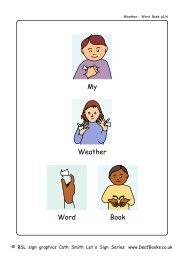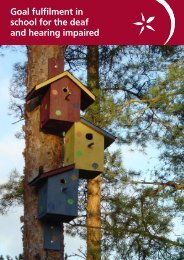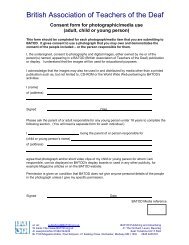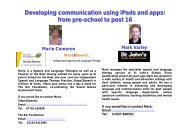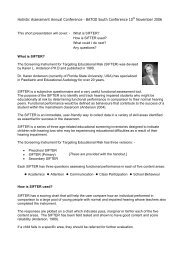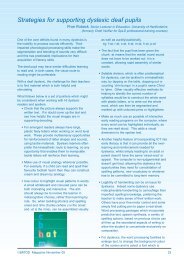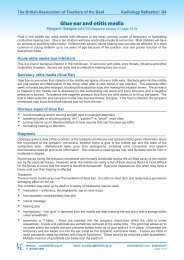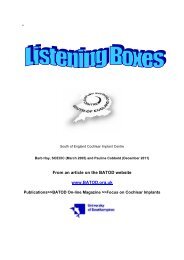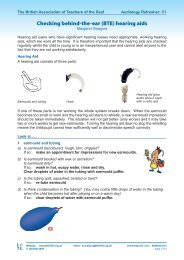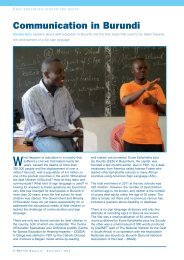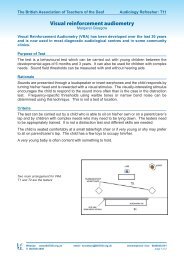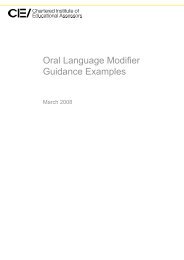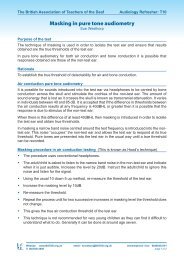Oral Language Modifier Handbook - batod
Oral Language Modifier Handbook - batod
Oral Language Modifier Handbook - batod
You also want an ePaper? Increase the reach of your titles
YUMPU automatically turns print PDFs into web optimized ePapers that Google loves.
<strong>Oral</strong> <strong>Language</strong> <strong>Modifier</strong><strong>Handbook</strong>March 2008
Chartered Institute ofEducational Assessors29 Bolton StreetLondon W1J 8GPTel 0845 672 2123info@ciea.org.ukwww.ciea.org.uk
ContentsIntroduction 04Purpose and use 04Expectations and challenges 05Definition 06What is an <strong>Oral</strong> <strong>Language</strong> <strong>Modifier</strong> (OLM)? 06What is the role of an OLM? 06<strong>Language</strong> modified version of examination papers 07What an OLM is not 07Who can act as an OLM? 08Scope 08<strong>Oral</strong> <strong>Language</strong> Modification Process 09Preparing for assessment 10Teaching role vs modifying role 10Modification functions 10How things are different at exam time 11Applying to the Awarding Body 12Contribute to the discussion of the candidate’s needs 12Collect, collate and store evidence 12Involvement with parents/carers 12Knowledge of the system 13Making the application in time 14JCQ Modified Papers Form 7 - Application for ModifiedPapers 15Conducting Assessment 16Carrier and Technical <strong>Language</strong> 16Modify the grammar of the Carrier <strong>Language</strong> 18Modify Instructional <strong>Language</strong> 19Summary of examination issues 20Feeding Back after Assessment 21Complete Modification Cover Sheet 21
IntroductionPurpose and use1.2.3.4.This document is designed for use by <strong>Oral</strong> <strong>Language</strong> <strong>Modifier</strong>s (OLMs) whoare working with the GCE and GCSE awarding bodies in England, Walesand Northern Ireland.This document does not have statutory status. Rather, it provides practicalguidance on how the language of examinations can be modified to giveall candidates the fairest possible opportunities to demonstrate subjectattainment.This document gives some advice on the processes involved in <strong>Oral</strong><strong>Language</strong> Modification. It is intended to be used with the document entitledOLM Guidance Examples.This document offers a resource to reinforce good practice and supportcontinuing professional development. Individuals can use the material inthis document and in the OLM Guidance Examples to refine their own skills.Building up the knowledge and skills required to be able to adapt manydifferent forms of examination will take some time. Maintaining the integrityof the examination while helping language impaired candidates achieve thebest they can is a delicate balance. This set of documents is designed tohelp OLMs to find and keep this balance.04 OLM <strong>Handbook</strong>
Expectations and challenges5.6.It is expected that the role of the OLM will develop over time and thatthe professional development of the OLM will support the needs of anincreasingly wide range of candidates who would otherwise find theexamination a hurdle too far.The OLM will be expected to demonstrate the highest professional standardswhen working with candidates in the areas of preparing for assessment,conducting assessment and feeding back after assessment. Constant reviewof personal knowledge and skills is essential. The examination processmust be open to scrutiny by the appropriate bodies and the OLM mustensure that standards are maintained while seeing that candidates are notdisadvantaged.OLM <strong>Handbook</strong> 05
DefinitionWhat is an <strong>Oral</strong> <strong>Language</strong> <strong>Modifier</strong> (OLM)?The <strong>Oral</strong> <strong>Language</strong> <strong>Modifier</strong> (OLM) is a role created to provide a reasonableadjustment in examinations for candidates who require a level of languagesupport beyond that provided by a reader.This role was originally provided for deaf/hearing-impaired candidates whosepreferred language was English. (You might know this role by its former title of“<strong>Oral</strong> Communicator”)It has now been extended to provide for other candidates who have a specificlanguage difficulty, disorder or delay.For examinations in March and June 2008, the regulations of the Joint Councilfor Qualifications (JCQ) allow an OLM to be provided for candidates “for whoman oral language modifier represents their normal way of working and who havea reading comprehension score that is below average”. These regulations maychange for future examinations.What is the role of an OLM?The OLM is allowed to explain or re-phrase the carrier language in anexamination paper to clarify the meaning for the candidate.The OLM can check that the candidate has understood the rubric and canrespond if the candidate is confused by the meaning of a particular question.The OLM must not re-phrase or explain any subject-specific or technical term.Equally, the OLM should not change command words or source material. (SeeAppendix 1 of the OLM Guidance Examples)Candidates using an OLM must be able to demonstrate the same subject skills,knowledge and concepts as other candidates. Explaining subject-specific ortechnical vocabulary would therefore compromise the demands of the questionand may constitute malpractice.06 OLM <strong>Handbook</strong>
<strong>Language</strong> modified version of examination papersA language modified paper should be requested for all candidates requiring anOLM. Often papers are modified at source by the awarding body. This meansthat a specialist in modification will have made suggestions about languagebefore the paper is finalised. Such a paper is thus modified for all candidates.If such a paper is not available when a modified paper is requested, thena teacher qualified in language modification will modify the specific papersrequested. <strong>Language</strong> modified papers should reduce the incidence of acandidate asking an OLM for clarification, although even a well modified papermay contain Carrier <strong>Language</strong> that the candidate finds inaccessible.What an OLM is notThe role of an OLM is different from that of a reader. A reader can only readthe questions and cannot re-phrase or explain the Carrier <strong>Language</strong>. An OLMshould only be requested if the Carrier <strong>Language</strong> of examinations is likely to beinaccessible even if the questions are read out aloud.A candidate may have a reader or an OLM or both. However, the reader and theOLM are likely to be the same person.An OLM is different from a Sign <strong>Language</strong> Interpreter. A Sign <strong>Language</strong>Interpreter’s task is to present written information in sign language withoutmodification or explanation. Deaf candidates who use English as their preferredlanguage would not usually benefit from a Sign <strong>Language</strong> Interpreter. Manydeaf candidates, however, have language difficulties and an OLM would beappropriate. The OLM appointed should speak clearly and their lips must bevisible. The OLM should be someone familiar to the candidate.For some candidates, an OLM may need to ask the centre’s ExaminationsOfficer to apply to awarding bodies to use manually coded English. This wouldinclude fingerspelling or Sign Supported English.OLM <strong>Handbook</strong> 07
Who can act as an OLM?• The OLM must be appointed by the centre• The OLM must be able to distinguish between Carrier <strong>Language</strong>and subject-specific language• The OLM must be able to explain and re-phrase the carrierlanguage of a particular question• The OLM must be aware of the regulations and proceduresrelating to OLM• The OLM should be familiar to the candidate. In some cases thismay be essential. For example, a deaf candidate who relies onlipreading a familiar face or a candidate with an autistic spectrumdisorder who might be disturbed by an unfamiliar helper.(If the OLM is not familiar to the candidate, the candidate shouldhave the opportunity of a trial presentation to get to knowthe appointed OLM)• The OLM should have had some training in language modificationand have some knowledge of the theories underpinning thelanguage modification process and the strategies involved• Ideally, the OLM should demonstrate a minimum standard ofLevel 3 in English. In order to recognise difficult language structuresthe OLM must have the necessary grasp of language. Changingexamination wording “on the spot” can be challenging and the OLMmust have the personal skills to do this• The OLM should have some knowledge or experience of the subjectmatter being assessed in the examination. This might be difficult butthe OLM does need to know which words are subject specificScopeInitially, the use of an OLM will only apply to GCE and GCSE examinations.08 OLM <strong>Handbook</strong>
<strong>Oral</strong> <strong>Language</strong> Modification ProcessPreparing for AssessmentWorking with other staffWorking with the candidatePreparing the candidateGuiding the candidate’sunderstandingThe OLM will probably have to work closelywith the SENCO, specialist teachers andExaminations Officer.Ideally the OLM would have a workingrelationship with the candidate on a regularbasis.The OLM should make the candidate aware ofthe different roles that each of them will havewhen it comes to examination.The candidate will need help to understandinstructional verbs and frequently usedexamination words. This should be worked onwell in advance of the examination.Conducting AssessmentOriginal source material or questionWhat are the problems?Familiarity with typical examination material isimportant - the OLM needs to know the kind ofissues that might arise.eg confusing wording, ellipsis, use of passivevoiceCould material be more clearlywritten?How might you rephrase things?Will this work in an oral / signingcontext?The OLM cannot rewrite the paper BUT canthink how it might be amended.The OLM has to think quickly and workout how best to rephrase elements of theexamination. This relies on the skills of theOLM.The OLM must make the changes work withinthe restrictions of time and place and for thecandidate.Feeding Back afterAssessmentWho needs to know?Using feedback to informpreparationThe relevant interested parties must be keptinformed - eg Examinations Officer, SENCO,awarding body, parents.Use experience from one round of OLM workto prepare for the next, eg prepare trainingmaterials based on the most recent round ofexaminations.OLM <strong>Handbook</strong> 09
Preparing for assessmentTeaching role vs modifying roleIt is expected that the candidate will be prepared in advance of the examinationso that the candidate is aware of the different roles performed by teacher,support worker and OLM. With some candidates this will need to take placeover an extended period of time. The OLM may be involved in helping with thispreparation.Most OLMs will be familiar to the candidate as they already relate to her/him ina teaching or support role. It could be unsettling for a candidate who is used tobeing directed to an answer in class to be told in an examination that help can’tbe given except to re-phrase a particular question. It is helpful for a candidate toknow what to expect in the examination, and how support in these conditions willbe different.It is very important that the candidate knows that the same person might havedifferent roles. The OLM might be someone who works with the learner on adaily basis. The candidate needs to understand that in exam conditions thisrelationship will be different from the relationship in class.The OLM and other staff should:• Prepare the candidate to expect change in the role and function ofsupport staff• Prepare the candidate to act as a candidate as well as a learnerModification functions• Prepare the candidate to discriminate between support functionsand modification functions• Guide the candidate to understand the impact of instructional verbsand frequently used examination words• Encourage the candidate to ask questions appropriately• Make the candidate more aware of the role of source materials.(eg a booklet of sources for a history paper might be confusing to acandidate who is not familiar with that particular format)10 OLM <strong>Handbook</strong>
How things are different at exam timeI am a different person in exams (the OLM)• I can only help in certain ways• I can’t give you clues like I do in lessons• I can’t give you examples like I do in lessons• I can’t tell you if your answers are right or wrong• I can’t check your work to see if you have understood• I can say the questions a different way if you are confused, but thereare some words I can’t changeYou are a different person in exams (the candidate)• You can’t walk around• You can’t use the computer to look things up• You have to leave your bag outside. You can only take what youneed for the exam (such as a pen and pencil). No books or mobilephone• You must be quiet and put your hand up if you need help• It’s your job to think “Do I understand?” and ask for help if you’re notsure what a question meansThe candidate should have been taught subject specific vocabulary:• In a Science exam, for example candidates would be expected to knowthe difference between a dependent and independent variable• In Design Technology, they would be expected to know what designcriteria areThe candidate should not expect to have such words and phrases explained byan OLM.Similarly they should not expect to have source material modified. Sourcematerial tends to be original and might be an extract from a book, a letter, aleaflet etc. The candidate should be prepared by studying source material beforethe examination.OLM <strong>Handbook</strong> 11
Applying to the Awarding BodyContribute to the discussion of the candidate’s needsBefore applying to the awarding body for an OLM, a Specialist Teacher willassess and discuss the candidate’s needs. It may be that a reader, for example,is a more appropriate reasonable adjustment to apply for. Since the personacting as the OLM is likely to be employed at the school or centre, they shouldbe involved in these discussions at an early stage.Collect, collate and store evidenceEvidence that the candidate has a significant language need should berecorded. If the candidate has a specific kind of help in class, that too should berecorded as it is essential information to send to the awarding body. An OLM cannot be used, for example, if the candidate does not normally receive help withlanguage/comprehension in lessons.The Specialist Teacher or Educational Psychologist must also show thatthe candidate has a reading comprehension in the below average range asmeasured by a standard test. This must be carried out within two years of thestart of the examination series or during the teaching programme leading to theaward.Involvement with parents/carersThe OLM might be involved in deciding with parents the reasonable adjustmentsto be applied for. Parents should be assured that the adjustments will benefittheir child and that final certificates will not state that an OLM has been used.The OLM needs to understand:• the process of using the evidence necessary• the appropriate format for evidence• how to make the application, using the rules and guidance to help12 OLM <strong>Handbook</strong>
Knowledge of the system• The SENCO or Specialist Teacher would be expected to identify children withspecial needs as early as possible, liaising with feeder schools beforetransition. Many centres have Cognitive Ability Tests (CATs) in Y7. Resultsfrom such tests could be useful to the OLM• The Specialist Teacher or Educational Psychologist would need to choosesuitable assessments for individual students and, after assessment, identifythe access arrangements needed for each child with special educationalneeds. These might include arrangements that could be granted by thecentre (such as up to 25% extra time or rest breaks) or arrangements thatcould only be granted by the awarding body (such as a reader or OLM)• The SENCO or Specialist Teacher will liaise with the Examinations Officerconcerning Access Arrangements required. Usually the Examinations Officerwill send off the appropriately completed paperwork or inform the awardingbodies online of the arrangements that are to be put in place• The Examinations Officer will be informed by the awarding bodies if AccessArrangements have been granted• The Examinations Officer appoints invigilators, readers, OLMs etc andmakes them aware of their responsibilities. It is important that the personchosen is suitably qualified, knowledgeable and has the interpersonal skillsnecessary for the job• It is important for the OLM to be aware that there are different accessarrangements for National Curriculum Tests. The OLM is not an arrangementthat is available for National Curriculum TestsFor further guidance see:JCQ regulations (pp14-16, 30-37) and JCQ/Modified papers Form 7 (pp73-4)OLM <strong>Handbook</strong> 13
Making the application in timeIt is essential that application for Access Arrangements and reasonableadjustments are made in time. The OLM might be involved in helping to ensurethat the Examinations Officer gets the required information well before deadlinesare reached. For the May/June 2008 series, the deadline for modified paperswas 31 January 2008, the deadline for other Access Arrangements was 21February 2008.The OLM should also be made aware of any modular exams taken by thecandidate which may well be the first GCSE exams taken. Subject specialiststaff and the Examinations Officer should work with the OLM to ensure theappropriate procedures are followed. For Modular Science GCSE, for example,the first exams take place in November of Y10 (or in some cases Y9), andthe deadline for applications requesting arrangements and modified papers is30 th September. Examinations Officers should ask for the appropriate accessarrangement requested to be applied to all exams in a modular series.There may also be the need for the OLM to be available when coursework isbeing set.14 OLM <strong>Handbook</strong>
JCQ Modified Papers Form 7 - Application for Modified Paperswww.jcq.org.uk/access_arrangements/OLM <strong>Handbook</strong> 15
Conducting AssessmentCarrier and Technical <strong>Language</strong>It may be that the awarding body has highlighted the words in the modifiedquestion paper that cannot be changed. If not, the OLM must be quite clearwhat is subject-specific language and what is Carrier <strong>Language</strong>. If unsure, therelevant words or phrases should not be modified.It is not always obvious which words are subject-specific:• “Locate” can in most instances be changed to “find” but in Geography it is asubject-specific term that cannot be modified• “Hard” and “soft” are everyday words, but in Science, “hard water” and “softwater” are subject-specific terms• In History, a candidate should be aware of the term “primary evidence” butmight be confused if this were changed to “first-hand information”Since candidates are taught subject-specific vocabulary, the OLM could beputting a candidate at a disadvantage by changing these terms.Equally, an OLM may be inadvertently giving the candidate an advantage bymodifying subject-specific terms. Doing this could make the question invalid.OLMs who use a sign with a deaf candidate must be especially careful. If, forexample, the word “triangle” appeared in the modification of a Maths question, itwould have to be fingerspelled as the sign could give an unfair advantage. Manysigns for technical words indicate the meaning of the word - help which wouldnot usually be available to a candidate.16 OLM <strong>Handbook</strong>
The OLM needs to be able to:• Determine the difference between Carrier and Technical <strong>Language</strong>in different contexts• Show how the same word can be both Carrier <strong>Language</strong> andTechnical <strong>Language</strong> in different contexts• Understand the purpose of source materials. These must notbe modifiedSource materials are often used to support examination papers. They mayinclude letters, maps, charts, extracts, etc. They are relevant to an examinationtask but were created for another purpose. Source material can usually berecognised by an acknowledgement that is printed next to it eg extract from apoem by Wilfred Owen, 1917. Source material must not be modified under anycircumstances.There will be instances where stimulus material has been written by the PrincipalExaminer. (This will usually be identified as “original” or simply appear withouta source reference at all.) Readability should have been considered during theprocess of writing the stimulus material. The OLM should be cautious aboutmodifying such material and should do so only if the Principal Examiner’sintended responses are not compromised.OLM <strong>Handbook</strong> 17
Modify the grammar of the Carrier <strong>Language</strong>The OLM should be able to recognise when complex language structures exist.In turn, the OLM should be able to modify and simplify the language whileretaining the level of conceptual difficulty of the question.• The OLM must remember that a modified question should requirethe same subject skills, knowledge and concepts as the originalquestion and enable the candidate to meet the same assessmentobjectives• The OLM should be able to recognise grammatical structures whichare difficult for weak readers. These include subordinate clauses,passive verbs, negatives, adverbial connectors and ellipsis. (Seeexamples in the accompanying OLM Guidance Examples document)• If the OLM is required to modify, the OLM should consider the wholequestion, its meaning and the answer that is expected• The OLM should be aware that it may be necessary to modifyparagraphs or full sentences, rather than individual words orphrases to make the question accessible• Long questions may need considerable re-structuring but the OLM mustnot interfere with the question numbering• There is no “right answer” to a modification. The OLM is successfulwhen able to give a modified version that the candidate understands,which does not alter the meaning and which does not unfairlyadvantage the candidate18 OLM <strong>Handbook</strong>
Modify Instructional <strong>Language</strong>The OLM needs to be aware that some instructional words demand higher orderresponses than other words.ExampleList three cities that you could visit if you were in FranceThis is the simplest level of demand. It requires only the recall ofknowledge.Evaluate the importance of Paris to the French peopleis a question requiring the very highest order skills.There is a well defined hierarchy of such skills and the words associated withthem. This can be found in Appendix 1 of the accompanying OLM GuidanceExamplesIt is important that the OLM is aware of frequently used examination wordsthat should not be changed. The supporting document entitled OLM GuidanceExamples contains detailed information on this topic.OLM <strong>Handbook</strong> 19
Summary of examination issuesFor the candidate at exam time• Is it clear which questions you have to answer?• Is it clear what you have to do?• If you have a choice, are you sure you have picked the best question(s)to answer?• Ask if you are not sure what you have to do• If you are not sure what a question means, then ask for help, butremember I can’t change words to do with the subject and can’thelp you with the answerFor the OLM at exam time• Make sure the candidate understands what is expected andunderstands the rubric• Look through the questions (though you may not be able to openthe paper in advance). Once you are sure the candidate has startedworking in a positive way, work through a spare copy of the paperand try to anticipate which questions the candidate will finddifficult to understandConsider the following:• How these questions might be rephrased?• Is the information separate from the question?• Are the sentences too long? Is there any irrelevant information you canignore? (careful!)• What is the examiner asking the candidate to do? What kind of answer isexpected?• Are you aware of any subject-specific language that can’t be changed?• Are you aware of any source material that can’t be changed?If a candidate asks for help, make sure you are aware of what you can andcannot do to help.20 OLM <strong>Handbook</strong>
Feeding Back after AssessmentComplete Modification Cover SheetThe OLM needs to be able to:• Write accurate descriptions that reflect what has taken place• Complete the form according to the regulations and guidance• Ensure the Examinations Officer and invigilators understand and areaware of what has been done• Make the cover sheet available to all those who need to know(Examinations Officer; invigilator, inspector subject staff)Before the exam starts, the OLM should explain his/her role to the invigilator.During the exam, invigilators should be in a position to listen in to themodifications undertaken in order to maintain accountability. In order that arecord of modifications is available for later reference, a copy of the completedform needs to be kept by the Examinations Officer at the centre.The OLM might find it helpful to take rough notes as they make modificationsthroughout the exam, and fill in Form 6a after the exam has finished.It might be appropriate to make a recording of the first few times the <strong>Oral</strong>Modification is undertaken, with written notes made after the exam after referringto the recording. It is expected that gradually the OLM would gain confidencein producing written records during the exam of modifications that have beenmade.OLM <strong>Handbook</strong> 21



